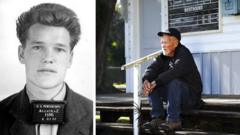**In a recent interview, Alcatraz's presumably last living inmate, Charlie Hopkins, offers a vivid narrative of his time inside the notorious prison and weighs in on former President Trump's controversial idea to reopen it, emphasizing both logistical challenges and the intent behind the proposal.**
**Alcatraz's Last Inmate Reflects on Trump's Reopening Proposal**

**Alcatraz's Last Inmate Reflects on Trump's Reopening Proposal**
**Charlie Hopkins, now 93, shares insights on life in Alcatraz and views on Trump's intent to revive the infamous prison.**
Charlie Hopkins, who may be the last living former inmate of Alcatraz, recently spoke out about the historical prison that housed him for three years, sharing his experiences and opinions on a surprising proposal made by former President Donald Trump to reopen the prison. At 93 years old and residing in Florida, Hopkins recalls his time at Alcatraz, noting the isolation and silence of the island prison, which once housed some of America’s most infamous criminals.
Sentencing him to 17 years for kidnapping and robbery, the authorities moved Hopkins to Alcatraz in 1955. Reflecting on the “deathly quiet” atmosphere, he likens the loneliness experienced at night to the mood of a Hank Williams song: “I’m so lonesome I could cry.” Now, he reflects on being informed that he is likely the last surviving inmate from that era, though the BBC could not independently verify this claim.
In recounting his life in Alcatraz, Hopkins spoke about the infamous criminals he encountered, including Al Capone and Robert Stroud, notorious figures that have since become part of cinematic lore. He described the prison as clean yet lacking in amenities, and his days were filled with boredom. He recalled engaging himself by cleaning the facility but also noted moments of rebellion that led to solitary confinement.
Despite managing to get into trouble among such notorious company, he remembers significant efforts to escape. His attempts involved clandestine planning with fellow inmates, including the theft of hacksaw blades—an endeavor ultimately foiled by the guards. This reliance on illicit tactics to achieve freedom highlights the desperation experienced by many confined individuals.
As Hopkins commented on Trump's recent statements regarding the potential reopening of Alcatraz, he expressed skepticism about the feasibility and seriousness of such a plan. The prison, now a decaying museum drawing millions of tourists annually, has deteriorated significantly and requires exorbitant restoration investment. “It would be so expensive,” Hopkins insisted, quite practically addressing the enormous financial challenges ahead of any revitalization efforts.
While Trump debuted this proposal to curb crime and reinforce law and order, experts concur with Hopkins that revitalizing Alcatraz for modern use would be both impractical and unrealistic. Moreover, Hopkins, who holds a strong affinity for Trump, perceives this suggestion as more of a symbolic gesture aimed at garnering public attention rather than a genuine operational strategy.
Since his release in 1963, Hopkins has sought to reshape his identity away from crime, diligently working various jobs in Florida and now cherishing family moments with his daughter and grandson. His reflections on past grievances have materialized into a 1,000-page memoir, capturing the essence of his tumultuous experience and personal growth stemming from his Alcatraz chapter.




















